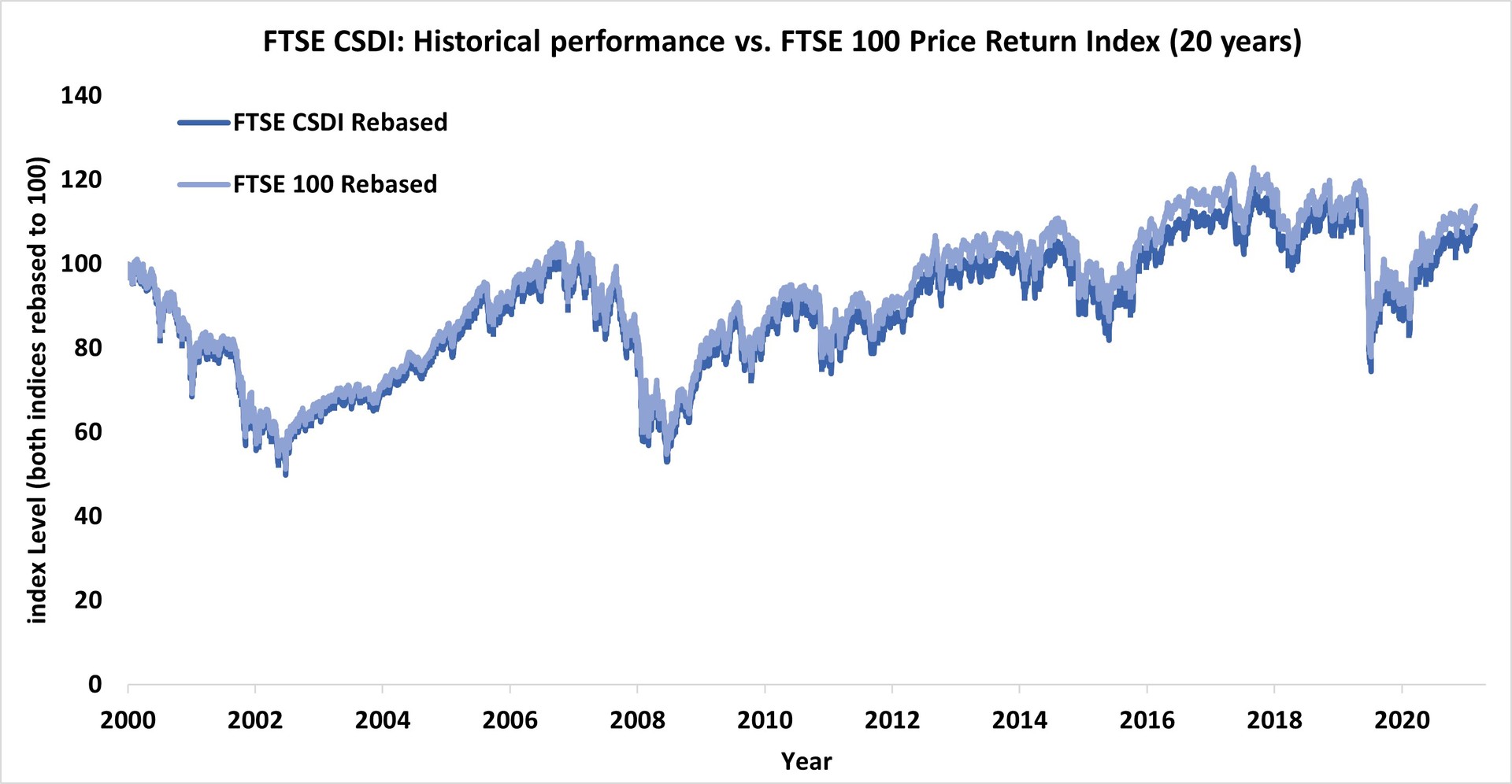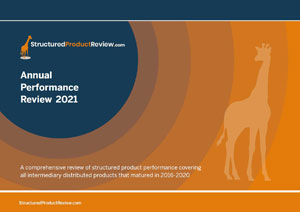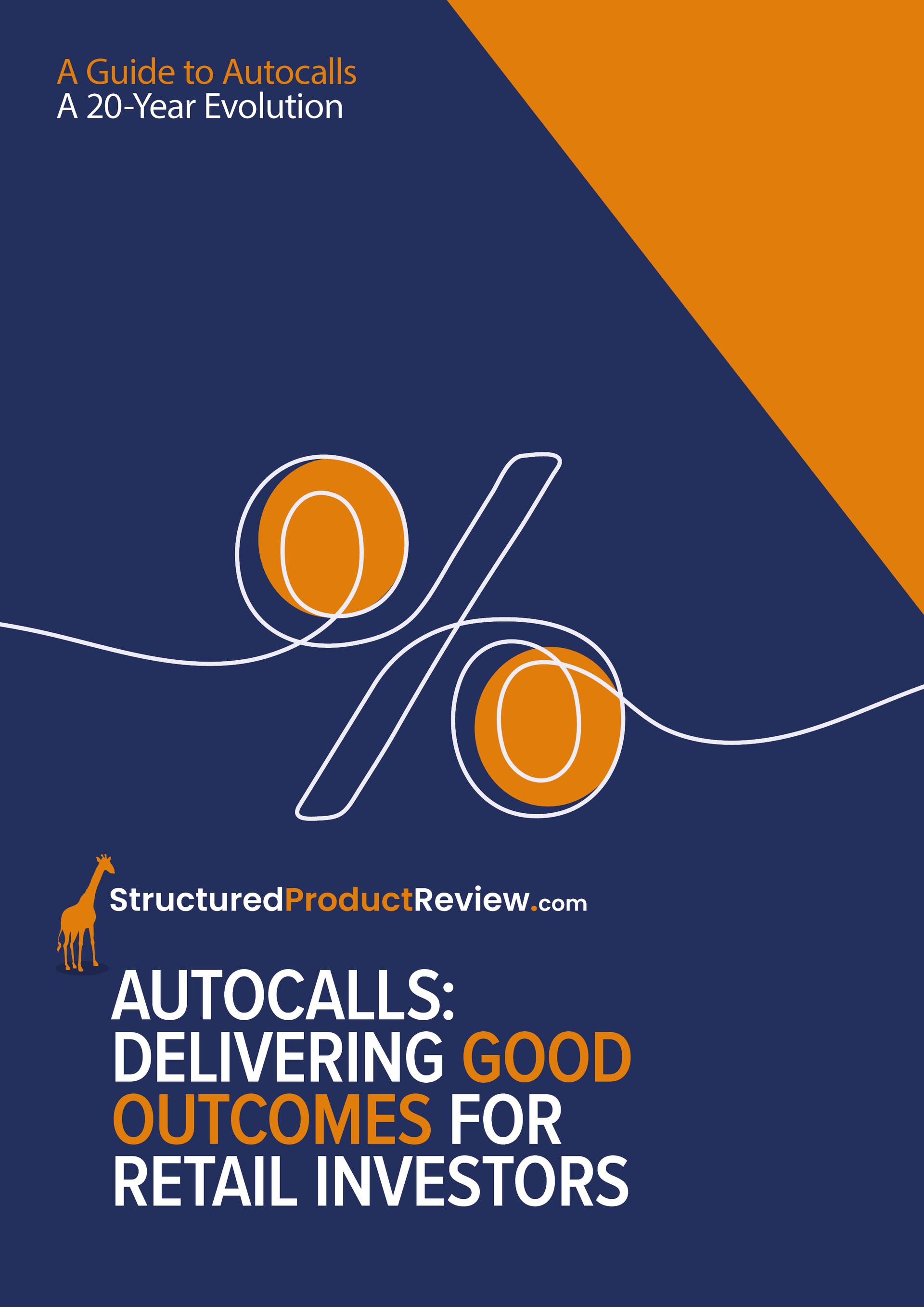24/11/2021
The FTSE Custom 100 Synthetic 3.5% Fixed Dividend Index (CSDI hereafter) was launched in 2020, and it has now been one year since the strike date of the first UK retail structured product linked to the performance of this index[1].
The CSDI was introduced in reaction to falling FTSE 100 Index dividend yield expectations during the progression of the Coronavirus pandemic; throughout 2020, 53 current or former members of the FTSE 100 Index had cut, deferred, or cancelled over £37 billion of dividend payments[2]. The forecasted dividend yield for 2020, as quoted in December 2019, was 4.7% but as at December 2020 the actual yield had fallen to 3.2% (AJ Bell).
Falling dividend expectation, coupled with pandemic fuelled uncertainty, resulted in banks erring on the side of the caution by building in a greater margin for error when pricing FTSE 100 linked structured investments. Consequently, the coupons offered on FTSE linked products were substantially lower than pre-pandemic levels, and the CSDI was introduced to offer a solution…
Designed especially for structured products, the CSDI tracks the same 100 shares but unlike the FTSE 100, the CSDI includes the benefit of the dividends paid by the 100 companies (which have historically averaged around 3.5% per annum) and then deducts the equivalent to a fixed 3.5% dividend per annum, on a daily basis. Despite being over 98% correlated to the FTSE 100 Index, the of pricing structured products using the CSDI translates to a greater coupon than an otherwise equivalent FTSE 100 contract as a function of the end investor accepting the risk of dividend variability.

Source: Mariana. The FTSE CSDI was launched on 1 July 2020, and the chart abovetherefore includes simulated historical performance up until this date.
Since the strike date of the first CSDI linked plan, the Mariana 10:10 Plan November 2020 (6th November 2020), and 8th November 2021, the FTSE 100 Index rose by 23.53% whereas the CSDI rose by 23.24% - a different of just 0.29%.
The following table compares the indicative pricing offered by Morgan Stanley for that first Plan based on both the FTSE 100 Index and the CSDI, highlighting the benefit of the CSDI in achieving an uplift in the return offered.
|
|
Coupon offered linked to the FTSE 100 Index |
Coupon offered linked to the CSDI |
|
Option 1 (step down) |
4.65% |
7.15% |
|
Option 2 (at-the-money) |
5.70% |
9.00% |
|
Option 3 (hurdle) |
7.12% |
11.50% |
Source: Mariana, November 2020. Indicative pricing from Morgan Stanley.
All options of the 10:10 November 2020 Plan are currently on track to mature next year, with the CSDI currently well above its November 2020 level. As at 23rd November 2021 option one has an indicative surrender value of £108.8 representing an 8.8% gain, for option two the gain is 12.25% and for option three it is 15.64%.
As we return to a pre-pandemic economic environment, dividend yields on the FTSE 100 Index are improving and whilst they are still below pre-pandemic levels, the forecasts now expect to see them rise above the twenty-year average of 3.5% for 2021[3]. It is our view that the UK retail sector will continue to benefit from the CSDI as an optional underlying, as supported by the table below, which relates to the 10:10 Plan December 2021, as priced by Citigroup.
|
|
Coupon offered linked to the FTSE 100 Index |
Coupon offered linked to the CSDI |
|
Option 1 (step down) |
6.00% |
7% |
|
Option 2 (at-the-money) |
7.50% |
8.85% |
|
Option 3 (hurdle) |
8.80% |
10.80% |
There will of course come a point when the coupons under new CSDI contracts are in line with FTSE 100 contracts – though it seems that the FTSE 100 dividend yield will need to be considerably above the 3.5% level before coupons align. This is because banks will understandably, continue to factor in a degree of caution when it comes to their forward dividend expectations. In the meantime, where the actual FTSE 100 dividend yield is above the fixed 3.5% decrement under the CSDI, investors can expect to benefit from not just higher potential coupons but also an index that should slightly outperform the FTSE 100.
For more information on the FTSE CSDI, please see here. A link to the current price of the Index can be accessed via www.Lowes.co.uk/CSDI and as long as dividend yields don’t change significantly, the FTSE 100 can be followed as a rough proxy for the CSDI.
Details of the latest Mariana 10:10 Plans, linked to the performance of the FTSE CSDI, can be found here.
Structured investments put capital at risk.
Past performance (actual or simulated) is not a guide to future performance.
Disclosure of interests: Lowes has provided input into the concept, development, promotion and distribution of the 10:10. Lowes has a commercial interest in these investments as a result of its involvement. Where Lowes is involved in advice on these investments to retail clients, it will not receive benefit of any fees for its involvement, other than those fees payable by the client to Lowes.
Also in this section
- 2,000 and counting
- Q2 2024 maturity results
- 20 years of autocall maturities
- Product focus - June 2024
- Fixed income or interest?
- Maturities of the month - May 2024
- The barrier debate - revisited
- Product focus - April 2024
- Maturities of the month - April 2024
- Time to call
- I don't believe markets are ever too high for Structured products!
- Notes on counterparty exposure
- Return of Nikkei
- Q1 2024 issuance
- Q1 2024 maturity results
- Structured Products – AAAAAGH!
- Hop in CIBC
- Re-enter Santander
- How to build a financial fortune - revisited
- Issuance in 2023
- Where's the risk?
- Questionable offerings
- Challenging the case against structured products - 'Loss of dividends'
- Navigating the investment landscape
- Challenging the case against structured products - Counterparty risk
- 6-year autocalls approaching final destination
- 1,750 FTSE capital at risk autocall maturities
- The leopard that changed her spots
- Q3 2023
- Challenging the case against structured products - Keydata
- Dilemmas for UK IFA's and the unique role of Structured Products
- 'High charges'
- Precipice bonds
- Intro
- FTSE 100 Contingent Income
- Indexing the indices
- Something different
- Investing through volatility
- 100 10:10s
- The best or worst?
- The 10%/25% 'Rule' that never was
- Structured products and the yield curve
- Fixed income: Capital at risk?
- Prospects for UK inflation - and fun with A.I!
- The Barrier Debate
- More Deposits for now
- Last of the Americans
- What if?
- Time heals all wounds, we hope...
- How to diversify portfolios using structured products?
- The Proof Is In The Pudding...
- Debunking Structured Misconceptions
- 1,500 FTSE Capital-at-Risk Autocall Maturities
- Q3 2022 Maturity Results
- What do we prefer?
- Deposits vs Capital ‘Protected’
- There’s time yet…
- Where did you invest your clients?
- A Six-Month Reflection
- Return of the Rev Con
- Happy 2nd Birthday FTSE CSDI
- Q2 2022 Maturity Results
- The best and worst yet still the best
- Critique my Suitability - Mariana 10:10 Plan June 2022 (Option 2)
- 10/10 for 55 10:10’s
- Q1 2022 Maturity Results
- 'How to build a financial fortune': a follow up
- Critique my Suitability - Mariana 10:10 Plan April 2022 (Option 2)
- 2021 Capital-at-Risk Autocall Maturity Review
- An unwelcome return...
- CSDI's First Birthday
- Bon Anniversaire
- Introducing the FTSE Custom 100 Synthetic 3.5% Fixed Dividend Index
- Q3 2021 Maturity Results
- Critique my Suitability - Mariana 10:10 Plan October 2021 (Option 2)
- Blurring the lines...
- Beware of false knowledge; it is more dangerous than ignorance
- Good news, bad news...
- Certainty is Certainly a Benefit
- Critique my Suitability - Mariana 10:10 Plan September 2021 (Option 2)
- A Twenty-Year Progression
- Q2 2021 Maturity Results
- Nine 8:8s Post Positive Returns in Falling Markets
- Critique my Suitability
- Q1 2021 Maturity Results
- Morgan Stanley’s Marvelous Maturity Medley
Current Products
We review the UK's retail structured investment sector, providing pertinent support for Professional Advisers and relevant research tools.
View all ⟶


